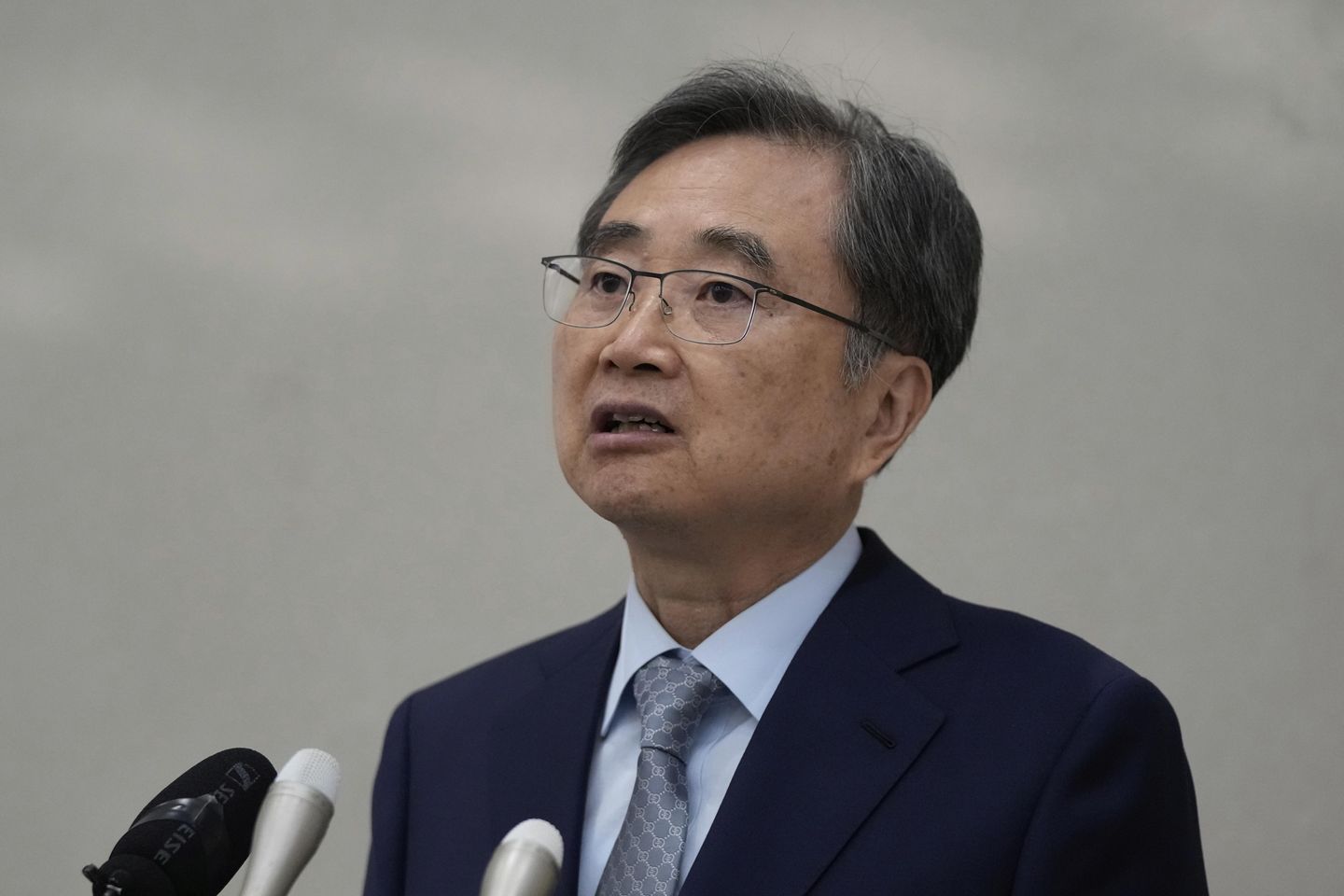
SEOUL, South Korea — South Korea’s top diplomat was heavily diplomatic Friday but admitted that the issues currently dividing Seoul and Washington are “very serious.”
Speaking with foreign reporters amid simmering national indignation over a Sept. 4 immigration raid on a Hyundai-LG electric vehicle battery plant in Georgia, Foreign Minister Cho Hyun said he “respects” the U.S. right to enforce its laws.
But he also said the South Korean government has to “fulfill our responsibility” to ensure that its workers’ human rights were not violated during the ordeal.
Other issues fraying ties between the two countries include the 25% tariffs Mr. Trump slapped on Korean vehicles exported to the U.S., while competitor Japan faces 15% tariffs. And working-level discussions on a $350 billion South Korean investment pledge in U.S. manufacturing are said to be fraught.
The South Korean government has opened an inquiry into the raid and the United States’ treatment of the workers. More than 300 workers were detained by Immigration and Customs Enforcement during the raid, placed in an ICE detention facility and deported back to South Korea on Sept. 11.
A bilateral mechanism under discussion would be tasked with issuing appropriate visas to South Korean workers heading to the U.S., Mr. Cho said. Its format and start date has not been announced.
The Georgia manufacturing plant’s Korean management failed to obtain the correct visas for the specialist workforce setting up the factory before it opened, prompting the raid and subsequent detentions.
Koreans were stunned that 317 fellow citizens working on a $4.3 billion, high-tech investment in the U.S. had been detained by their closest ally.
More so, given that an Aug. 25 summit between President Trump and Korean President Lee Jae-myung in Washington had been, in Mr. Cho’s words, “a resounding success” that “created momentum for deepened cooperation.”
Urgent diplomacy saw the workers returned home on a chartered flight last week. Since then, South Korean media has been running articles about the hardships of their brief captivity by ICE.
Interviewees expressed surprise at the appearance of armed immigration agents at their work site and shock when they found themselves being shackled and sent to a detention facility.
Many complained about the coldness of the ICE facility, the lack of privacy in its toilets, foul-smelling drinking water, poor food and insufficient beds with mold-covered mattresses.
They said they felt trauma at the uncertainty of their situation; of the documents they were asked to sign, despite in many cases not speaking English; and an inability to contact loved ones.
Mr. Cho said he had been assured by Secretary of State Marco Rubio that the workers will face no problems if they return to work in the U.S.
But some have said they are unwilling to return to the U.S. to complete the factory installation.
Mr. Cho was restrained. Korean media was not.
“Images of Korean workers in chains, taken to harsh detention centers while building a factory in the United States, will leave lasting scars on bilateral relations,” warned the center-right Joongang Ilbo on Sept. 10.
“Trump needs to make an official apology,” urged the leading left-leaning daily the Hankyoreh in an editorial on Sept. 16, echoing union demands.
“This raid went beyond merely enforcing U.S. immigration law,” the editorial continued. “Rather, it was a grave diplomatic incident, an insult to Koreans’ dignity and an assault on an ally’s trust in the U.S.”
Mr. Lee has warned that the issue could damage Korea’s future investments in the U.S.
Long relationship tested
In a bilateral relationship that has seen multiple ups and downs, the current situation is at a low.
The Korea-U.S. security alliance was signed in 1953, after the two allies fought the Korean War against China and North Korea.
Subsequently, Korea provided the largest contingent of foreign troops to fight with the U.S. in the Vietnam War.
As citizens of a nation that historically has been surrounded by larger powers, South Koreans have been grateful for the nuclear security umbrella Washington provides and the stationing of troops on their soil as a deterrent against North Korea.
The U.S. has always been the country’s leading or number two buyer of its exports, as well as a leading investor and technology supplier. South Koreans greatly value U.S. colleges and universities, and 2.2 million Korean-Americans live in the U.S.
However, the “big brother–little brother” relationship has undergone friction.
Diplomatically, those frictions are felt in Washington’s pressure on Seoul to fall in line with U.S. policies toward Beijing and Tokyo.
Politically, many Koreans simmered against Washington’s support for the military regimes running Korea between 1961 and 1987.
Huge anti-American protests were held in 2002 and 2008, over, respectively, a U.S. military vehicle striking and killing two schoolgirls as they walked along a road, and over allegations – subsequently proven false – that the U.S. was exporting infected beef to Korea.
The current bad feelings have not reached those depths, though a source at the National Police Agency said, “There have been an increase in rallies [near the U.S. Embassy] because of the case” in Georgia.
However, no mass protests have been reported. A demonstration called by civic groups, expected to draw thousands of protesters on Saturday, appears to have been canceled for unclear reasons.
Some hope that ongoing issues, once worked out, could end up strengthening Korean-American ties.
“The U.S. and Korea have enjoyed a 72-year relationship, I don’t think that will change,” said James Kim, CEO of the American Chamber of Commerce in Korea. “Now that both parties understand what to do and what not to do …there is an opportunity to fix some gray areas.”













